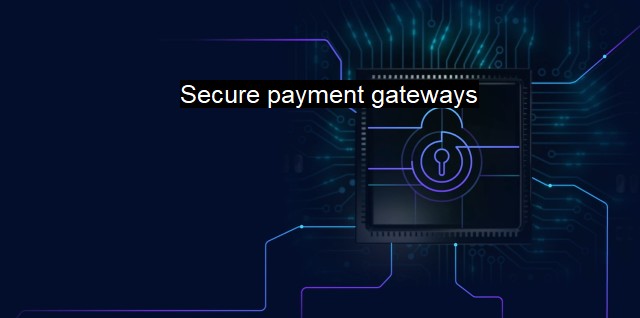What are Secure payment gateways?
The Importance of Secure Payment Gateways in the Age of E-commerce: Protecting Customer's Payment Information from Hackers and Fraudsters.
Secure payment gateways are an integral part of secure e-commerce transactions, significantly contributing to a digitally advanced era characterized by online transactions that are efficient, flexible, and secure. They operate as a digital mechanism facilitating the transfer of payment information from the customer to the retailer and subsequently, from the customer's bank to the retailer's bank. Think of these gateways as credit card checkout counters which exist primarily as a virtual entity entrenched in strict cybersecurity measures.The concept of 'Secure Payment Gateways' engulfs convening monetary transactions by capturing and safely transmitting users' sensitive data like debit/credit card number and bank account details across networks. These gateways authenticate the transaction points, ensuring that only secure, authorized, and legitimized transactions take place. secure payment gateways enable individuals and businesses to complete sensitive financial interactions with a decreased risk of cyber threats such as hacking or identity theft.
Cybersecurity adherence in payment gateways cannot be overemphasized. Robust cybersecurity measures are quintessential because internet transactions do not occur in an isolated environment and are subjected to frequent cyber-attacks. Secure payment gateways are backed by avant-garde security measures, including advanced data encryption techniques, Secure Sockets Layer (SSL), and Transport Layer Security (TLS), and 3D secure protocol implemented to maintain the confidentiality and security of customer data.
Data encryption, which paves the way for secret key and public key methodologies, ensures that during the transmission over the network, the crucial data is being converted into an unreadable format. On reaching the desired destination, the data is decrypted and used for the transaction process. The purpose is to safeguard the transaction details from unethical hacking instances and assist in checking data integrity.
Secure Sockets Layer (SSL) and Transport Layer Security (TLS) are security protocols acting as the backbone for payment gateways. SSL/TLS protocols are responsible for creating an encrypted link between the web server and the customers' browser, ensuring all data transferred is kept private and integral. These widely accepted standards provide the utmost level of trust and security and are essential for businesses keen on establishing secure session links with their audiences.
3D Secure represents an additional layer of security used in online debit and credit card transactions. Often implemented by payment gateways, it requests additional verification from the customer, like a personal identification number (PIN) or a password. The likes of Verified by Visa, MasterCard SecureCode, and American Express SafeKey are under the 3D Secure umbrella, offering an added level of fraud prevention tuning for the consumers to feel secure while transacting.
Cybersecurity trends have been evolving rapidly, and anti-virus protection is another critical component enhancing the security portfolio of payment gateways. Anti-virus scans have been fortified by robust firewalls curating a protected environment impeding malicious intrusions. Constant efforts are also being made to maintain timely system upgrades, patch vulnerabilities, and stay ahead of the continually transforming technological threats.
Secure Payment Gateways have transformed e-commerce by fusing efficiency, flexibility, and security into one potent mix for online transactions. It also bestempers simplicity into the shopping experience. At its core, it resonates with tech-entrenched security protocols downplaying direct risks incurred through cyber threats. The integration of advanced data encryption, security protocols (SSL and TLS), 3D security standards, and potent anti-virus protection has enabled payment gateways to provide a safe passage for data exchange holistically basking in robust cybersecurity measures. Buoyed by technological trends and customized security solutions, Secure Payment Gateways offer a valuable digital cash counter facilitating secure online transactions.

Secure payment gateways FAQs
What is a secure payment gateway?
A secure payment gateway is an online payment processing infrastructure that ensures secure transactions between the buyer and the merchant. It acts as a mediator between the buyer's bank and the merchant's bank, providing a secure platform for online transactions.How does a secure payment gateway protect my financial information?
A secure payment gateway uses encryption and tokenization to protect your financial information from cybercriminals. Encryption keeps your credit card information safe by scrambling it while tokenization replaces your sensitive information with a token that can only be decrypted by authorized parties. This way, your financial data is secure from hackers and cyber threats.What should I look for in a secure payment gateway?
When choosing a secure payment gateway, you should look for one that complies with industry standards, such as the PCI-DSS security framework. It should also offer multi-factor authentication, fraud detection and prevention, and support for multiple payment options. Lastly, the provider should have a transparent and efficient dispute resolution process.What are some examples of secure payment gateways?
There are several popular secure payment gateways, including PayPal, Stripe, Authorize.net, Braintree, and Skrill. These providers are known for their robust security measures and user-friendly interfaces that help protect against cyber threats and fraud.| | A | | | B | | | C | | | D | | | E | | | F | | | G | | | H | | | I | | | J | | | K | | | L | | | M | |
| | N | | | O | | | P | | | Q | | | R | | | S | | | T | | | U | | | V | | | W | | | X | | | Y | | | Z | |
| | 1 | | | 2 | | | 3 | | | 4 | | | 7 | | | 8 | | |||||||